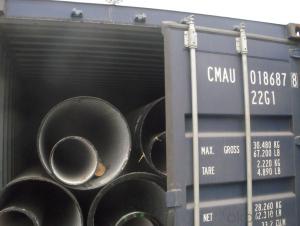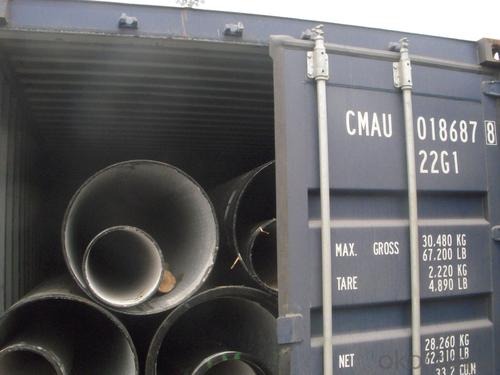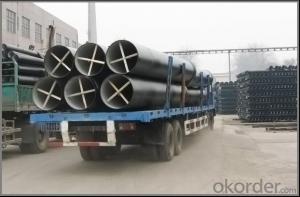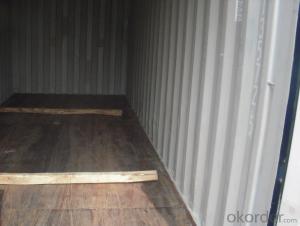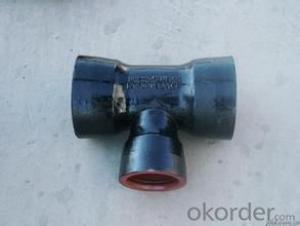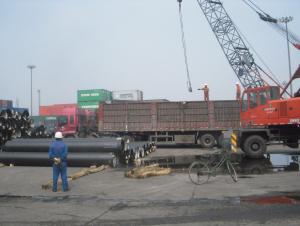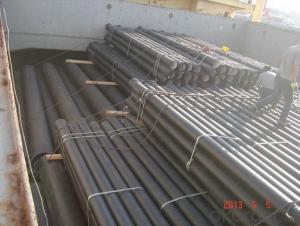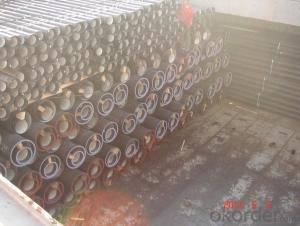DUCTILE IRON PIPES AND PIPE FITTINGS K8 DN350
- Loading Port:
- Tianjin
- Payment Terms:
- TT OR LC
- Min Order Qty:
- 25 m.t
- Supply Capability:
- 30000 m.t/month
OKorder Service Pledge
OKorder Financial Service
You Might Also Like
Material : Ductile Cast Iron
Size Range : DN 80mm to DN 2000mm
Unit Effective Length : 6m or 5.7m
Manufacture Standard: ISO 2531:1998/ EN 545:2006/EN 598:2007
Annual capacity : 200,000 tons
Coating Exterior: Zinc 130g/m2 according to ISO 8179-1 and bitumen coating 70 microns.
Cement Interior: Portland Cement/ High Alumina Cement/ Sulphate Resisting Cement Lining according to ISO 4179
Special requirements on external coating and internal lining can be applied
We also provide accessories such as SBR/EPDM rubber gaskets, lubricant paste, pipe caps, PE sleeves, etc.
Additional Parts:
Each pipe is strictly inspected according to related standard to ensure permanently high performance.
Easy Installation at site and service free for life
Long Service Lifespan
Quotation will arrive you within 24hours once we get your inquiry.
We guarantee offering you a competitive price.
A copy of original inspection reports of pipes will be offered after shipment.
Photos of loading process will be sent to the customer after shipment effect.
We will follow-up the delivery progress after shipment effect and update to the customer on weekly basis.
- Q: What is the maximum allowable joint deflection for ductile iron pipes?
- The maximum allowable joint deflection for ductile iron pipes varies based on the specific design and application requirements. However, it is generally recommended to limit joint deflection to a maximum of 5% of the pipe diameter to ensure the structural integrity and longevity of the pipeline.
- Q: How is ductile iron pipe installed?
- The installation of ductile iron pipe can be carried out using two different methods: trenchless technology or the open-cut method. When utilizing trenchless technology, a hole is drilled into the ground, and hydraulic jacks or winches are used to push or pull the ductile iron pipe into the hole. This approach minimizes disruptions to the surrounding environment and reduces the need for extensive excavation. On the other hand, the open-cut method involves excavating a trench to the necessary depth and width for the ductile iron pipe. The trench is then prepared by removing any debris or obstructions and ensuring a stable base. The pipe is subsequently lowered into the trench and aligned correctly with the assistance of laser or surveying equipment. Once the pipe is in place, joints are connected using either a rubber gasket or mechanical joint. The joints are carefully sealed to prevent any leakage. Backfill material is then meticulously placed around the pipe, ensuring proper compaction for stability and support. To avoid excessive settlement, the backfill is applied in layers. After completing the installation, the pipe undergoes testing to ensure its integrity. This may involve hydrostatic testing, where water is filled into the pipe and monitored for any signs of leakage or pressure loss. Overall, the installation of ductile iron pipe necessitates careful planning, excavation, alignment, joint connection, backfilling, and testing. It is crucial to adhere to industry standards and guidelines to achieve a successful and reliable installation that meets the required specifications.
- Q: Can ductile iron pipes be used for trenchless pipe rehabilitation methods?
- Trenchless pipe rehabilitation methods offer a way to repair or rehabilitate existing pipelines without the need for extensive excavation or trenching. In these methods, ductile iron pipes are often used due to their durability, strength, and resistance to corrosion. Various trenchless methods, such as pipe lining, pipe bursting, and slip lining, can be used to rehabilitate ductile iron pipes. These methods involve inserting a new lining or pipe inside the existing ductile iron pipe, which helps to extend its lifespan and improve its structural integrity. Ductile iron pipes are the preferred choice for trenchless rehabilitation because they can withstand the forces and pressures involved in the process, providing a reliable and long-lasting solution.
- Q: What is the purpose of ductile iron pipes?
- The purpose of ductile iron pipes is to provide a reliable and durable infrastructure for the transportation of fluids, such as water, sewage, and gas. Ductile iron pipes offer significant advantages over other materials such as steel or PVC pipes. One primary purpose is to ensure the safe and efficient supply of water to communities. Ductile iron pipes are designed to withstand high pressures and can handle the harsh conditions of underground environments, making them ideal for water distribution systems. They have a long service life and require minimal maintenance, reducing the need for frequent repairs or replacements. Another purpose is to effectively transport sewage and wastewater. Ductile iron pipes have excellent corrosion resistance, ensuring that they can withstand the corrosive nature of sewage and other waste materials. They are also structurally strong, capable of withstanding heavy loads and ground movements, making them suitable for underground sewer systems. Ductile iron pipes are also utilized for the transportation of gas. They have excellent mechanical properties and can withstand high-pressure applications, making them ideal for gas distribution networks. Additionally, their durability and resistance to external factors like soil movement or temperature changes make them a reliable choice for gas transmission systems. Overall, the purpose of ductile iron pipes is to provide a robust and long-lasting solution for the safe and efficient transportation of fluids, contributing to the development and maintenance of essential infrastructure systems that support our communities' needs.
- Q: What is the expected internal lining material for ductile iron pipes?
- Typically, the anticipated internal lining materials for ductile iron pipes are either cement mortar lining or polyethylene lining. Cement mortar lining serves as a protective layer on the inner surface of the ductile iron pipe, shielding it from corrosion and prolonging its lifespan. Conversely, polyethylene lining is a thermoplastic substance that possesses resistance against corrosion, abrasion, and chemicals, making it well-suited for situations involving aggressive substances or poor water quality. Depending on the project's specific requirements and conditions, both lining materials offer their own advantages and are commonly utilized within the industry.
- Q: Can ductile iron pipes be used in dam or reservoir projects?
- Yes, ductile iron pipes can be used in dam or reservoir projects. Ductile iron pipes are known for their durability, strength, and corrosion resistance, making them suitable for various applications, including water supply systems in dams and reservoirs. Additionally, their ability to withstand high pressure and adapt to ground movement makes them a reliable choice for such projects.
- Q: Can ductile iron pipes be used for underground cable conduits?
- Yes, ductile iron pipes can be used for underground cable conduits. Ductile iron pipes are known for their strength, durability, and corrosion resistance, making them suitable for various applications, including underground cable conduits. Their ability to withstand heavy loads and external pressures makes them a reliable choice for protecting and housing underground cables.
- Q: Is there any cast iron pipe used in the fire hose?
- I don't know, I only know that the fire pipes produced by our company is the base tube is a pipe, and then coated with a corrosion and non-toxic, long service life, we are Suzhou Yuyao Pipe Industry Co. Ltd. is a professional production of the manufacturers, oh
- Q: How much is the installation fee of the 400 largest ductile iron pipe?
- Ductile iron pipes mainly called centrifugal ductile iron pipe, it has the properties of nature, iron and steel, excellent corrosion resistance, good ductility, good sealing effect, simple installation, mainly for municipal, industrial and mining enterprises, water supply, gas, oil etc.. Water supply pipe is the first choice, with high cost performance.
- Q: Can ductile iron pipe be used for stormwater management systems?
- Yes, ductile iron pipe can be used for stormwater management systems. Ductile iron pipe is commonly used in various applications, including stormwater drainage systems. It is known for its strength, durability, and resistance to corrosion, making it ideal for withstanding the harsh conditions of stormwater management. Additionally, ductile iron pipe is easily installed and maintained, making it a cost-effective choice for stormwater management systems. Overall, ductile iron pipe is a reliable and suitable option for constructing stormwater management systems.
Send your message to us
DUCTILE IRON PIPES AND PIPE FITTINGS K8 DN350
- Loading Port:
- Tianjin
- Payment Terms:
- TT OR LC
- Min Order Qty:
- 25 m.t
- Supply Capability:
- 30000 m.t/month
OKorder Service Pledge
OKorder Financial Service
Similar products
Hot products
Hot Searches
Related keywords
